人教版高二英语选修八 Unit 1 A land of diversity Reading (1)课件(共20张PPT)
文档属性
| 名称 | 人教版高二英语选修八 Unit 1 A land of diversity Reading (1)课件(共20张PPT) | 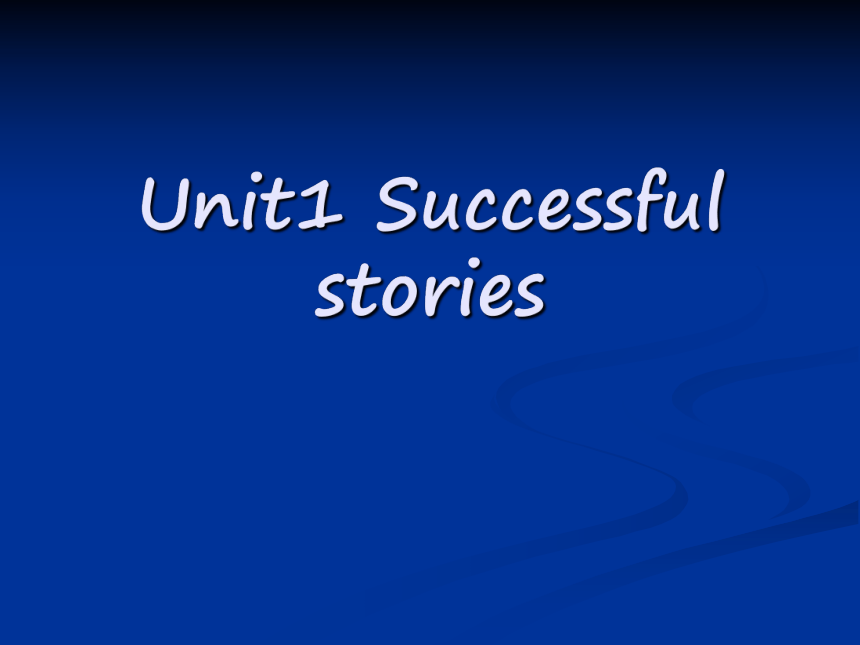 | |
| 格式 | zip | ||
| 文件大小 | 361.0KB | ||
| 资源类型 | 教案 | ||
| 版本资源 | 人教版(新课程标准) | ||
| 科目 | 英语 | ||
| 更新时间 | 2020-04-09 08:35:44 | ||
图片预览

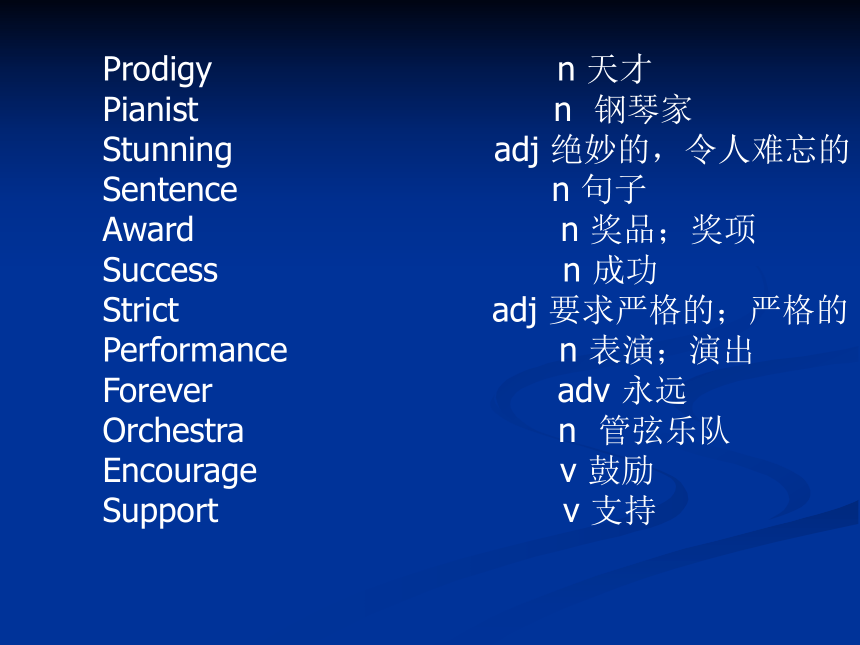
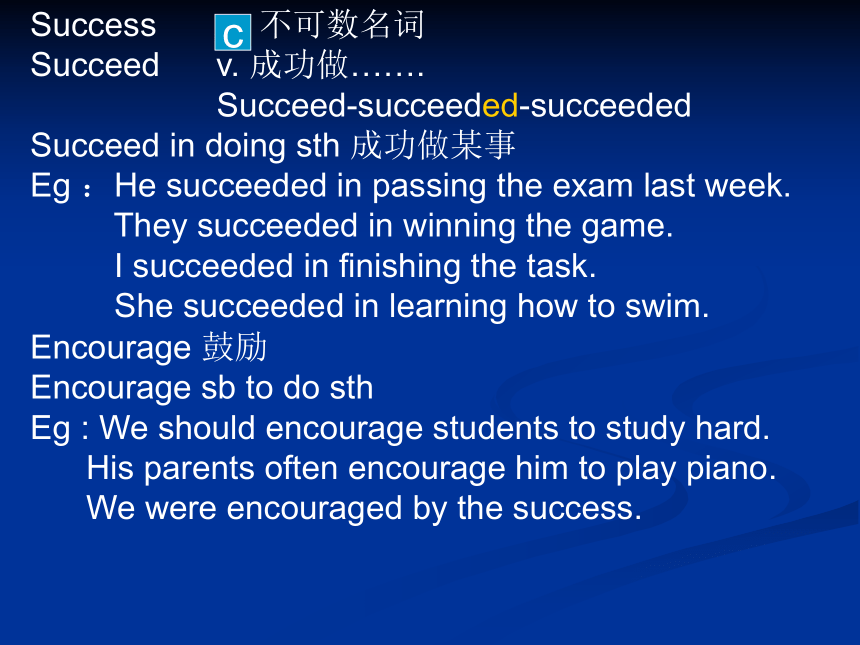

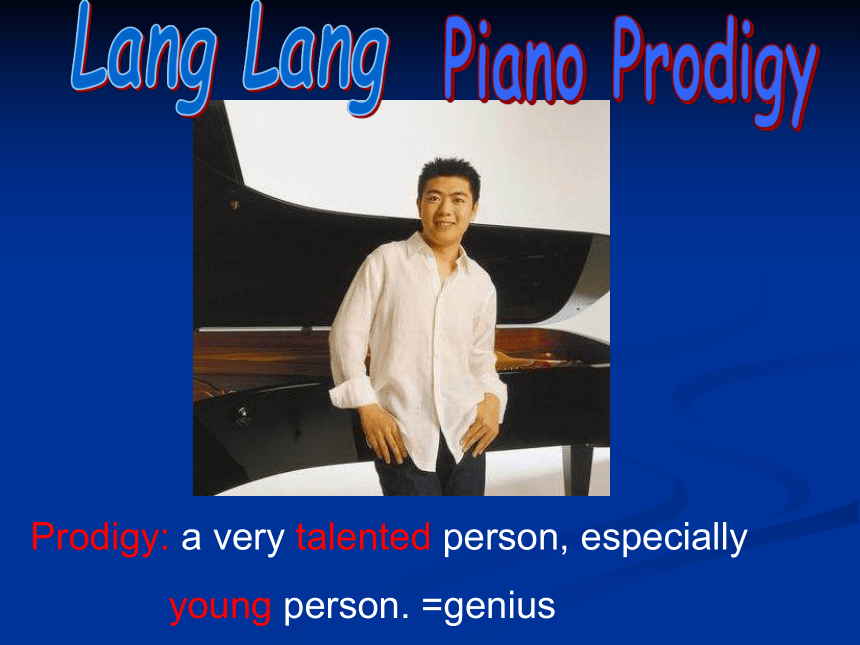

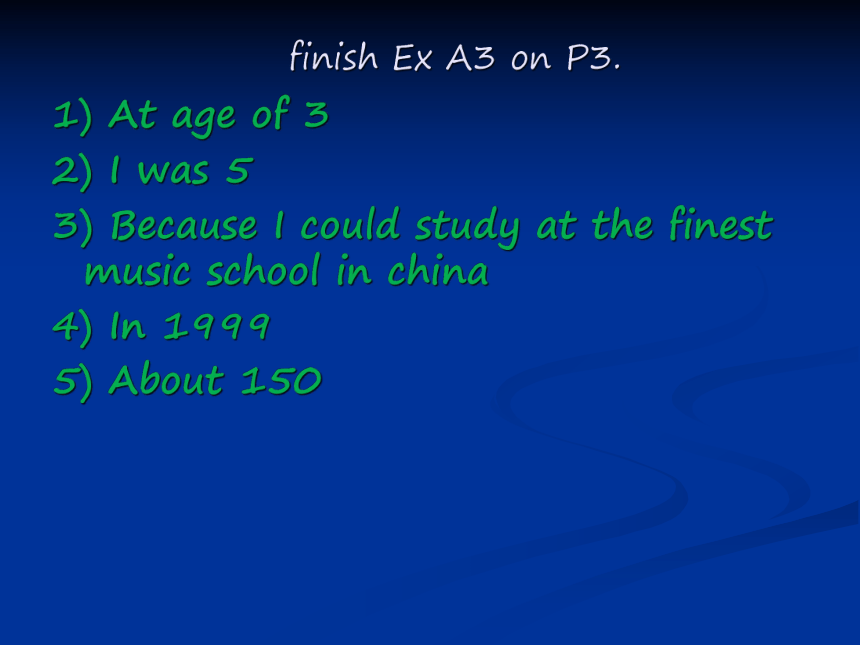
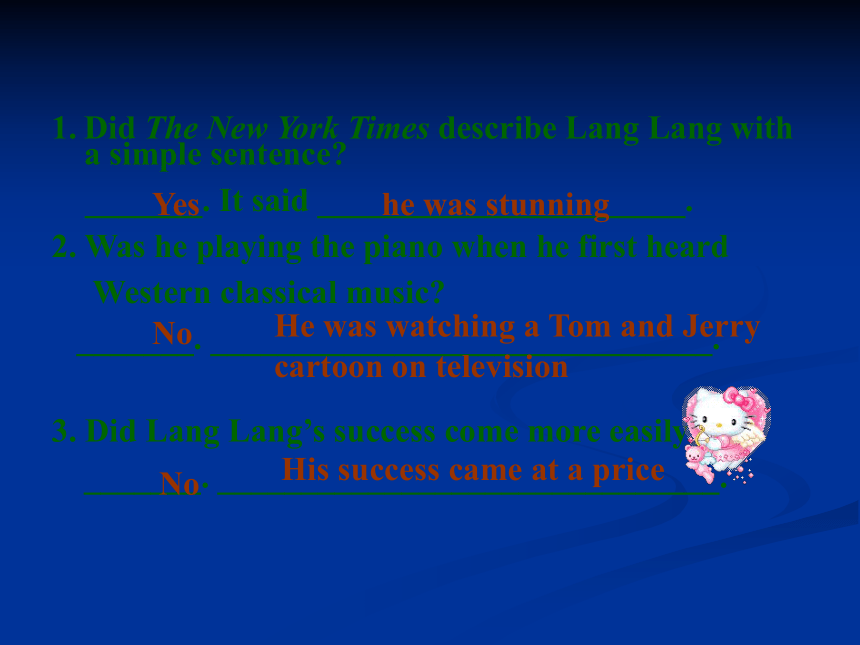
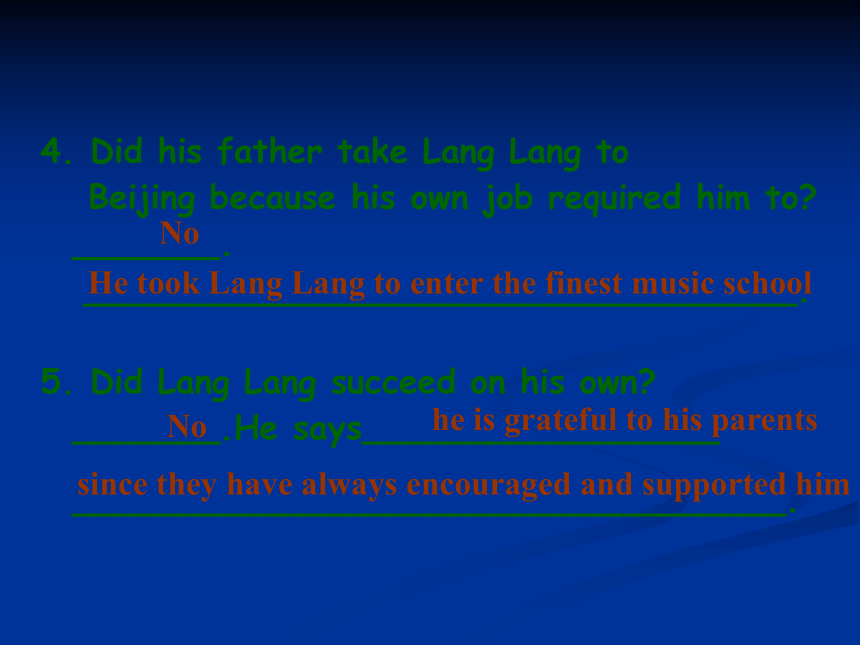
文档简介
(共21张PPT)
Unit1 Successful stories
Prodigy n 天才
Pianist n 钢琴家
Stunning adj 绝妙的,令人难忘的
Sentence n 句子
Award n 奖品;奖项
Success n 成功
Strict adj 要求严格的;严格的
Performance n 表演;演出
Forever adv 永远
Orchestra n 管弦乐队
Encourage v 鼓励
Support v 支持
Success 不可数名词
Succeed v. 成功做…….
Succeed-succeeded-succeeded
Succeed in doing sth 成功做某事
Eg :He succeeded in passing the exam last week.
They succeeded in winning the game.
I succeeded in finishing the task.
She succeeded in learning how to swim.
c
Encourage 鼓励
Encourage sb to do sth
Eg : We should encourage students to study hard.
His parents often encourage him to play piano.
We were encouraged by the success.
A famous athlete
Break the world record
Get the Olympic champion
……………….
Act many movie roles
Be popular in the world
Outstanding in actors
…………………
Why do you think they are successful?
Prodigy: a very talented person, especially
young person. =genius
1982
born
taking piano lessons.
won first prize
9
17
chance.
played
Shen Yang
In_______ He was_____ in ______
In 1985 He began______________________.
In 1987 He ___________ in the Shenyang Piano Competition.
At the age of He study at the finest music school in China.
at the age of ___ His life changes. He got his big _____.
In 2008 He _____ at the 2008 Beijing Olympic Games.
finish Ex A3 on P3.
1) At age of 3
2) I was 5
3) Because I could study at the finest music school in china
4) In 1999
5) About 150
Did The New York Times describe Lang Lang with a simple sentence?
_______. It said ______________________.
2. Was he playing the piano when he first heard
Western classical music?
_______. ______________________________.
3. Did Lang Lang’s success come more easily?
_______. ______________________________.
Yes
No
No
he was stunning
He was watching a Tom and Jerry cartoon on television
His success came at a price
4. Did his father take Lang Lang to
Beijing because his own job required him to?
_______.
__________________________________.
5. Did Lang Lang succeed on his own?
_______.He says_________________
__________________________________.
No
No
He took Lang Lang to enter the finest music school
he is grateful to his parents
since they have always encouraged and supported him
1.Ben was responsible for writing stories about
successful people for the school newspaper.
be responsible for (doing) sth意为“负责某事”
E.g. The pilot of the plane is responsible for the
passengers’ safety.
飞机驾驶员应对旅客的安全负责。
Li hua is responsible for cleaning the classroom.
李华负责打扫教室。
The girls are responsible of cooking in outing
女孩们在交友中负责烹饪。
2.Lang Lang began taking piano lessons at the age of
three.
At the age of …. 在几岁的时候
Eg :He left high school at age of 18
他18岁的时候高中毕业了。
I first see the panda at the age of 6.
我在六岁时第一次见到熊猫。
We will become adults at the age of 18.
我们18岁的时候就成为大人了。
3.However, Lang Lang’s success came at a price.
at a price是个固定词组,意为“付出代价”,
“以很高的代价”。
E.g. He will help you deal with the trouble at a price.
他将帮你处理这个麻烦但代价很高
You can get the book at a price.
你可以用高价买下这本书。
Many famous people achieve success at a price.
很多出名的人付出了很高的代价缺的成功。
He was determined to succeed at a price.
他决定以很高的代价取得成功。
Fall ill= be sick/ill 生病;病倒
Eg : He fell ill yesterday
他昨天病倒了
He is so tired that he falls ill
他太累了以至于病倒了。
She is very weak, so she often falls ill.
她太瘦弱了,所以她经常生病。
4.His father was very strict with him.
be strict with sb意为“对(某人)要求严格”。
e.g. His parents are strict with him.
他的父母对他很严格。
Most high schools are strict with students.
大多数高中对学生要求很严格。
对某事要求严格要用be strict in sth….
He is strict in his work.
他对工作很严格。
The teachers are strict in our behaviour.
老师们对我们的行为举止要求严格。
6.His father gave up his work.
give up意为“放弃”,常构成:give up sth/doing sth.
e.g. At last, they gave up the plan.
最后,他们放弃了那个计划。
Believe yourself. Don’t give it up.
相信自己,不要放弃。
7.LangLang was chosen to play in place of that pianist.
in place of=instead of意为“代替,而不是”,若后跟动词,
需加ing,一般它们用于名词,代词或介词短语前,
e.g. We’ll go by bus in place of/instead of on foot.
我们坐车去,而不步行去。
Nobody can be in place of her.
没有人可以代替她。
Our monitor is away, so I’m in place of him.
班长不在,我代替他。
8.He is grateful to his parents
Be grateful to sb/sth for doing sth
感谢/感激…..做了……
Eg : We should be grateful to our parents.
我们应该感谢我们的父母
We are grateful to you for all your help.
我们费城感激你所给我们的帮助。
We should be grateful to our country for her
mightiness.
我们应该感激祖国的强大。
I’m grateful to you for your support.
对你的支持我感激之至。
过去进行时
构成:陈述 was/were doing
否定 was not/wasn’t doing. Were not/weren’t
doing
疑问 when/where/what were you doing at 8:00/
at 10:00 yesterday
表示过去某时正在进行的状态或动作。
Eg : I was reading a book at 5 p.m. yesterday.
What were they doing just now?
My mother was washing clothes at 9 last night.
What was he researching all day last Sunday?
Ask: What were you doing at 6:30/at 7:00…….?
Answer: I am getting up at 6:30.
A time table in yesterday morning
6:30 Have tooth brash
7:00 Have breakfast
7:30 Go to school on foot
9:00 Have a class
10:30 Do the Setting-up exercise during break
11:45 Go home by bus
12:00 Have lunch
1:00 Take a nap
1. Li Jie ____________________________ at 7:30.
2. She _____________________________ at 8:30.
3. She and some friends _____________
_____________________ at 9:30.
4. They _____________________________ at 11:00.
5. They _____________________________ at 12:30.
6. They _____________________________ at 14:30.
7. She and a friend __________________
_____________________ at 15:30.
8. She ______________________________ at 16:30.
was getting ready to go out
was travelling on the underground
were buying
food in the market
were preparing lunch for fifty people
were having lunch
were tidying up and washing the dishes
were relaxing in a
tea shop with a friend
was going home on the underground
homework
Write a paragraph with the past continuous
tense to describe what you were doing at
different time yesterday. (about 150 words)
Unit1 Successful stories
Prodigy n 天才
Pianist n 钢琴家
Stunning adj 绝妙的,令人难忘的
Sentence n 句子
Award n 奖品;奖项
Success n 成功
Strict adj 要求严格的;严格的
Performance n 表演;演出
Forever adv 永远
Orchestra n 管弦乐队
Encourage v 鼓励
Support v 支持
Success 不可数名词
Succeed v. 成功做…….
Succeed-succeeded-succeeded
Succeed in doing sth 成功做某事
Eg :He succeeded in passing the exam last week.
They succeeded in winning the game.
I succeeded in finishing the task.
She succeeded in learning how to swim.
c
Encourage 鼓励
Encourage sb to do sth
Eg : We should encourage students to study hard.
His parents often encourage him to play piano.
We were encouraged by the success.
A famous athlete
Break the world record
Get the Olympic champion
……………….
Act many movie roles
Be popular in the world
Outstanding in actors
…………………
Why do you think they are successful?
Prodigy: a very talented person, especially
young person. =genius
1982
born
taking piano lessons.
won first prize
9
17
chance.
played
Shen Yang
In_______ He was_____ in ______
In 1985 He began______________________.
In 1987 He ___________ in the Shenyang Piano Competition.
At the age of He study at the finest music school in China.
at the age of ___ His life changes. He got his big _____.
In 2008 He _____ at the 2008 Beijing Olympic Games.
finish Ex A3 on P3.
1) At age of 3
2) I was 5
3) Because I could study at the finest music school in china
4) In 1999
5) About 150
Did The New York Times describe Lang Lang with a simple sentence?
_______. It said ______________________.
2. Was he playing the piano when he first heard
Western classical music?
_______. ______________________________.
3. Did Lang Lang’s success come more easily?
_______. ______________________________.
Yes
No
No
he was stunning
He was watching a Tom and Jerry cartoon on television
His success came at a price
4. Did his father take Lang Lang to
Beijing because his own job required him to?
_______.
__________________________________.
5. Did Lang Lang succeed on his own?
_______.He says_________________
__________________________________.
No
No
He took Lang Lang to enter the finest music school
he is grateful to his parents
since they have always encouraged and supported him
1.Ben was responsible for writing stories about
successful people for the school newspaper.
be responsible for (doing) sth意为“负责某事”
E.g. The pilot of the plane is responsible for the
passengers’ safety.
飞机驾驶员应对旅客的安全负责。
Li hua is responsible for cleaning the classroom.
李华负责打扫教室。
The girls are responsible of cooking in outing
女孩们在交友中负责烹饪。
2.Lang Lang began taking piano lessons at the age of
three.
At the age of …. 在几岁的时候
Eg :He left high school at age of 18
他18岁的时候高中毕业了。
I first see the panda at the age of 6.
我在六岁时第一次见到熊猫。
We will become adults at the age of 18.
我们18岁的时候就成为大人了。
3.However, Lang Lang’s success came at a price.
at a price是个固定词组,意为“付出代价”,
“以很高的代价”。
E.g. He will help you deal with the trouble at a price.
他将帮你处理这个麻烦但代价很高
You can get the book at a price.
你可以用高价买下这本书。
Many famous people achieve success at a price.
很多出名的人付出了很高的代价缺的成功。
He was determined to succeed at a price.
他决定以很高的代价取得成功。
Fall ill= be sick/ill 生病;病倒
Eg : He fell ill yesterday
他昨天病倒了
He is so tired that he falls ill
他太累了以至于病倒了。
She is very weak, so she often falls ill.
她太瘦弱了,所以她经常生病。
4.His father was very strict with him.
be strict with sb意为“对(某人)要求严格”。
e.g. His parents are strict with him.
他的父母对他很严格。
Most high schools are strict with students.
大多数高中对学生要求很严格。
对某事要求严格要用be strict in sth….
He is strict in his work.
他对工作很严格。
The teachers are strict in our behaviour.
老师们对我们的行为举止要求严格。
6.His father gave up his work.
give up意为“放弃”,常构成:give up sth/doing sth.
e.g. At last, they gave up the plan.
最后,他们放弃了那个计划。
Believe yourself. Don’t give it up.
相信自己,不要放弃。
7.LangLang was chosen to play in place of that pianist.
in place of=instead of意为“代替,而不是”,若后跟动词,
需加ing,一般它们用于名词,代词或介词短语前,
e.g. We’ll go by bus in place of/instead of on foot.
我们坐车去,而不步行去。
Nobody can be in place of her.
没有人可以代替她。
Our monitor is away, so I’m in place of him.
班长不在,我代替他。
8.He is grateful to his parents
Be grateful to sb/sth for doing sth
感谢/感激…..做了……
Eg : We should be grateful to our parents.
我们应该感谢我们的父母
We are grateful to you for all your help.
我们费城感激你所给我们的帮助。
We should be grateful to our country for her
mightiness.
我们应该感激祖国的强大。
I’m grateful to you for your support.
对你的支持我感激之至。
过去进行时
构成:陈述 was/were doing
否定 was not/wasn’t doing. Were not/weren’t
doing
疑问 when/where/what were you doing at 8:00/
at 10:00 yesterday
表示过去某时正在进行的状态或动作。
Eg : I was reading a book at 5 p.m. yesterday.
What were they doing just now?
My mother was washing clothes at 9 last night.
What was he researching all day last Sunday?
Ask: What were you doing at 6:30/at 7:00…….?
Answer: I am getting up at 6:30.
A time table in yesterday morning
6:30 Have tooth brash
7:00 Have breakfast
7:30 Go to school on foot
9:00 Have a class
10:30 Do the Setting-up exercise during break
11:45 Go home by bus
12:00 Have lunch
1:00 Take a nap
1. Li Jie ____________________________ at 7:30.
2. She _____________________________ at 8:30.
3. She and some friends _____________
_____________________ at 9:30.
4. They _____________________________ at 11:00.
5. They _____________________________ at 12:30.
6. They _____________________________ at 14:30.
7. She and a friend __________________
_____________________ at 15:30.
8. She ______________________________ at 16:30.
was getting ready to go out
was travelling on the underground
were buying
food in the market
were preparing lunch for fifty people
were having lunch
were tidying up and washing the dishes
were relaxing in a
tea shop with a friend
was going home on the underground
homework
Write a paragraph with the past continuous
tense to describe what you were doing at
different time yesterday. (about 150 words)
